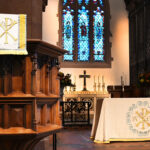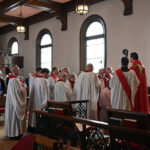It’s been my experience over the years of attending several Episcopal churches that while we share a common liturgy, a lot of what each parish does comes from tradition or is a reflection of parishioners past and present. This can be a good thing. Common, shared experiences can bond people and congregations together. The little quirks and unique touches help churches feel like homes.
That said, attending the Episcopal Parish Network (EPN) conference in Jacksonville earlier this year helped me realize that there is a lot to be said for working together and learning about what different parishes are doing. When we connect with each other, we realize that despite our differences, we are dealing with a lot of the same issues and situations. We are all facing what can feel like an overwhelming turning point in several different areas — the fallout of the COVID pandemic, the increasing secularization of American society, a growing perception of Christianity in our society that runs counter to what we believe as Episcopalians, and rapid advances and changes in technology.
The bulk of the conference I spent meeting with other wardens. It was there that our different experiences in our parishes became a strength as we came together to share how we were facing these situations. Realizing that we weren’t alone, and that it was okay if we didn’t have all of the answers ourselves, was reassuring. We could put together the parts we had figured out like pieces of a puzzle. Ideas like evening services, contemporary music and/or services, dressing more casually (so as not to intimidate those who got comfortable wearing sweatpants while attending online during lockdown), developing small groups and after school programs, making newcomer greeters more visible, discussion series that were open and promoted to the broader community, and increasing communication — these were ideas that all of us could take home and consider whether they were right for our own parishes.
Technology issues were something where my own parish, St. Thomas’s in Newark, has had some success and turned out to be my piece to contribute to the discussion. Some people reported that their parishes were very frustrated that they had members who still preferred to attend online rather than in person. At St. Thomas’s, we have accepted that online worship is the only option for some people, whether due to medical circumstances or distance — and how great it is that we now have the technology to allow those people to continue to worship with us! We invested in quality live-streaming and implemented a digital usher program to engage with those attending via YouTube in the chat. It put a different perspective on the situation for other attendees, and several asked me later for our digital usher script. This is an example of how sharing ideas can strengthen our congregations; if those parishes’ online members feel welcomed now instead of resented, it builds bonds and helps those members feel more connected to their faith.
Other parishes had different technological solutions, some of which we have already adopted at St. Thomas’s. One parish was using less paper by making a QR code for service leaflets available for those who prefer to use their phones or tablets. This also serves as an accommodation for those who prefer to adjust the font size to one that works best for them. We’ve implemented this ourselves now.
One thing that emerged was that when we are open and honest with ourselves and each other about our situations, truly innovative and creative ideas can emerge. There was an attendee from a parish in Virginia that like many, struggled with a building that had been built for a larger congregation back in the day. That building was now holding them back from fulfilling their mission. Their solution was to ground-lease their land, which led to the demolishing of their building, a new apartment building with over 100 units for lower-income residents, and the construction of a new church building better suited to their current needs. This exact idea won’t be the solution for all parishes that find themselves in that situation, but the realization that we can go that far outside of the box when brainstorming solutions is empowering.
I also attended a workshop on the Future of Beloved Community. Presenters and attendees alike from different parishes reported concluding that the Gospel is political, even though it is not partisan. Not discussing social justice and politics at all is itself a political position. Parishes that had embraced this work found themselves engaging youth and young adults, as well as forming connections with groups in their communities that had already started this work. They also advised being open to disruption and acknowledgement of painful histories such as owning enslaved people or perpetuating white supremacy via fighting against integrated schools and neighborhoods. Working together on this with other parishes can demonstrate that we as a denomination are committed to justice.
Another workshop I attended, where Cynde Bimbi of the Episcopal Church in Delaware was a presenter, was on the Future of Congregations. Isn’t that what all of us are trying to figure out? I am sure that a lot of the attendees were hoping for easy answers. But this workshop discussed the questions we all need to be asking ourselves — what will our congregations look like in 20 years? What will they need, want, and desire? What question would we have for them? It’s only when we try to picture the future that we can form a plan with concrete steps to get there. The answers we seek are in those questions. Obviously, things can change, and we may need to adapt those answers to new circumstances. We’ve seen how COVID upended everything, but also how we’re learning to work with that. We may find technological innovations like ChatGPT (artificial intelligence) daunting now, but I’m sure our ancestors thought the same of the printing press. Our institutions and practices have survived numerous changes over the past 2000 years, and that’s something in which I take comfort and strength. This world’s pain and need to hear our message of God’s love certainly haven’t changed, and by being willing to ask ourselves these questions and be open to any and all directions they may take us, we can continue to fulfill our mission.
Seeing it in person at the EPN conference, as well as in other places like Episcopal Facebook groups where people share questions and ideas, the future to me feels like parishes beginning to work together more and more. Initiatives and events are a great place to start. I’ve been heartened to see the beginnings of that here in Delaware.

Kristin Sausville is a contributor for the Delaware Communion Magazine and the senior warden at St. Thomas’s in Newark. She is a mother of two boys, wife, and world traveler. A bit of trivia: Kristin is a five-time Jeopardy champion.




